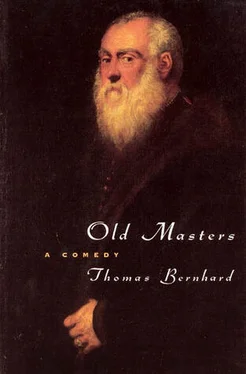White-Bearded Man one of the most magnificent paintings ever painted, I come to the Bordone Room here for this settee and for the ideal effect which the lighting has on my emotional capacity, actually for the ideal temperature conditions especially in the Bordone Room, and for Irrsigler who is the real Irrsigler only in the Bordone Room. The truth is I could never endure being in the vicinity of, for instance, Velazquez. Not to mention Rigaud and Largilliere whom I avoid like the plague. Here in the Bordone Room I have the best conditions for meditation, and if I ever felt like reading anything on this settee, such as my beloved Montaigne or my perhaps even better loved Pascal or my even better-lovedstill Voltaire, as you see my favourite authors are all French, not a single German, I can do so here in the most agreeable and the most useful way. The Bordone Room is my thinking as well as my reading room. And if I ever feel like a sip of water, Irrsigler brings me a glass, I do not even have to get up. People are sometimes surprised to see me here, sitting on the settee, reading my Voltaire and drinking a glass of pure water with it, they are astonished, they shake their heads and move on, and it is as if they regarded me as a madman enjoying a special state-authorized fool's licence. I have not read a book at home for years, here in the Bordone Room I have read hundreds of books, but that is not to say that I read all those books in the Bordone Room
through to the end, I have never in my life read a single book
through to the end, my way of reading a book is that of a highly talented page turner, that is of a person who would rather turn the pages than read, who therefore turns dozens, or at times hundreds, of pages before reading a single one; but when this person does read a page he reads it more thoroughly than anyone and with the greatest reading passion imaginable. I am more of a page turner than a reader, you should know, and I love turning pages just as much as reading, I have, in my life, turned pages a million times more often than I have read them, and always derived from turning pages at least as much pleasure and real intellectual enjoyment as from reading. Surely it is better to read altogether only three pages of a four-hundred-page book a thousand times more thoroughly than the normal reader who reads everything but does not read a single page thoroughly, he said. It is better to read twelve lines of a book with the utmost intensity and thus to penetrate into them to the full, as one might say, rather than read the whole book
as the normal reader does, who in the end knows the book he has read no more than an air passenger knows the landscape he overflies. He does not even perceive the contours. Thus all people nowadays read everything by flying over, they read everything and know nothing. I enter into a book and settle in it, neck and crop, you should realize, in one or two pages of a philosophical essay as if I were entering a landscape, a piece of nature, a state organism, a detail of the earth, if you like, in order to penetrate into it entirely and not just with half my strength or half-heartedly, in order to explore it and then, having explored it with all the thoroughness at my disposal, drawing conclusions as to the whole. He who reads everything has understood nothing, he said. It is not necessary to read all of Goethe or all of Kant, it is not necessary to read all of Schopenhauer; a few pages of
Werther, a few pages of
Elective Affinities and we know more in the end about the two books than if we had read them from beginning to end, which would anyway deprive us of the purest enjoyment. But such drastic self-restraint requires so much courage and such strength of mind as can only rarely be mustered and as we ourselves muster only rarely; the reading person, just as the carnivorous, is gluttonous in the most revolting manner and, like the carnivorous person, upsets his stomach and his entire health, his head and his whole intellectual existence. We even understand a philosophical essay better if we do not gobble it up
entirely and at one go, but pick out a detail from which we then arrive at the whole, if we are lucky. Our greatest pleasure, surely, is in fragments, just as we derive the most pleasure from life if we regard it as a fragment, whereas the whole and the complete and perfect are basically abhorrent to us. Only when we are fortunate enough to turn something whole, something complete or indeed perfect into a fragment, when we get down to reading it, only then do we experience a high degree, at times indeed a supreme degree, of pleasure in it. Our age has long been intolerable as a whole he said, only when we perceive a fragment of it is it tolerable to us. The whole and the perfect are intolerable, he said. That is why, fundamentally, all of these paintings here in the Kunsthistorisches Museum are intolerable, if I am to be honest, they are abhorrent to me. In order to be able to bear them I search for a so-called
massive mistake in and about every single one of them, a procedure which so far has always attained its objective of turning that so-called perfect work of art into a fragment, he said. The perfect not only threatens us ceaselessly with our ruin, it also ruins everything that is hanging on these walls under the label of
masterpiece. I proceed from the assumption that there is no such thing as the perfect or the whole, and each time I have made a fragment of one of the so-called perfect works of art hanging here on the walls by searching for a massive mistake in and about that work of art, for the crucial point of failure by the artist who made that work of art, searching for it until I found it, I have got one step further. In every one of these paintings, these so-called masterpieces, I have found and uncovered a massive mistake, the failure of its creator. For over thirty years this, as you might think, infamous calculation has come out right. Not one of these world-famous masterpieces, no matter by whom, is in fact whole or perfect. That reassures me. It makes me basically happy. Only when, time and again, we have discovered that there is no such thing as the whole or the perfect are we able to live on. We cannot endure the whole or the perfect. We have to travel to Rome to discover that Saint Peter's is a tasteless concoction, that Bernini's altar is an architectural nonsense. We have to see the Pope face to face and
personally discover that all in all he is just as helpless and grotesque a person as anyone else in order to bear it. We have to listen to Bach and hear how he fails, listen to Beethoven and hear how he fails, even listen to Mozart and hear how he fails. And we have to deal in the same way with the so-called great philosophers, even if they are our favourite spiritual artists, he said. After all, we do not love Pascal because he is so perfect but because he is fundamentally so helpless, just as we love Montaigne for his helplessness in lifelong searching and failing to find, and Voltaire for his helplessness. We only love philosophy and the humanities generally because they are absolutely helpless. We truly love only those books which are not a whole, which are chaotic, which are helpless. The same is true of everything and everybody, Reger said, we only feel particularly attached to a person because he is helpless and not a whole, because he is chaotic and not perfect. Yes, I say, El Greco, fine, but the good man did not know how to paint a hand! and I say Veronese, fine, but the good man of course did not know how to paint a natural face. And what I said to you about the fugue today, he was saying yesterday, not one of all the composers, even the greatest, composed a perfect one, not even Bach, who surely was tranquillity itself and pure compositional clarity. There is no perfect picture and there is no perfect book and there is no perfect piece of music, Reger said, that is the truth, and this truth makes it possible for a mind like mine, which all its life was nothing but a desperate mind, to go on existing. One's mind has to be a searching mind, a mind searching for mistakes, for the mistakes of humanity, a mind searching for failure. The human mind is a human mind only when it searches for the mistakes of humanity. The human mind is not a human mind unless it sets out to search for the mistakes of humanity, Reger said. A good mind is a mind that searches for the mistakes of humanity and an exceptional mind is a mind which finds these mistakes of humanity, and a genius's mind is a mind which, having found these mistakes, points them out and with all the means at its disposal
Читать дальше












